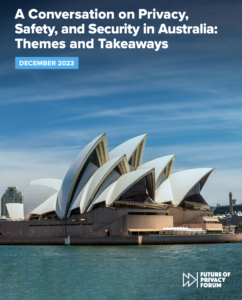We’re in this Together: Expert Speakers Explore Topics Related to Protecting Privacy, Security, and Online Safety for Young People in Australia
On June 26, the Future of Privacy Forum (FPF) and the Australian Strategic Policy Institute (ASPI) co-hosted an online discussion on Privacy, Security, and Online Safety for Young People in Australia. The panel included welcoming remarks from John Verdi, FPF, and Bart Hogeveen, ASPI, and consisted of experts across all three disciplines, including:
- Mike Bareja, Deputy Director of Cyber, Technology & Security, ASPI (moderator)
- Peter Leonard, Principal and Director, Data Synergies
- Lizzie O’Shea, Founder and Chair, Digital Rights Watch
- Amber Hawkes, Principal, Online Safety & Digital Literacy, Pearl Consulting
- Dr. Susanne Lloyd-Jones, Cyber Security CRC Post Doctoral Fellow at the UNSW Allens Hub for Technology, Law and Innovation
- Hayden Wells – Detective Acting Superintendent, Australian Centre to Counter Child Exploitation (ACCCE)
The discussion came just days after Australia’s eSafety Commissioner published the final pending industry standards to govern the treatment of Child Sexual Exploitation Material (CSEM) as well as pro-terror material, crime and violence material, and drug-related material (collectively, “class 1A” and “class 1B” material). These final standards address Designated Internet Services and Relevant Electronic Services, joining six other codes covering other categories of services.
In October 2023, prior to the publication of the draft industry standards, FPF hosted a roundtable conversation with expert contributors from across Australia to explore potential benefits and risks that may arise with different approaches. The final Outcomes Report from that event highlighted key takeaways relevant to regulations in this area. The Office of the eSafety Commissioner will now look to industry codes for “class 1C” and “class 2” material, to cover online pornography and “other high-impact material.”
The Australian Parliament is also currently considering updates to the Privacy Act to govern how personal information may be processed. The updates, which are expected later this year, are likely to include proposed additional protections to apply only to children (defined as those who are under 18).
Speakers at the June 26 event engaged in an educational and far-ranging conversation that raised several important topics and themes. While the panelists discussed the need to ensure that any action in this area was appropriate to Australia’s unique culture and needs, many also recognized that the approaches being implemented in Australia are serving as the basis for countries around the world – including countries with fewer protections for individual rights.
Several speakers spoke to the importance of having inclusive conversations that break down the silos around related regulatory topics. As was noted, government and industry responses to questions around safety, security, and privacy often overlap and generally would benefit from greater collaboration, both in places where the proposed response to one interest may contravene another as well as in places where action taken in one area may compliment or benefit the work being done in another.
Many speakers referenced on-going discussions on encryption (i.e., technology applied to protect transactions from unwanted or unintended recipients) and indicated that it went to the heart of these three topics. While encryption, and specifically end-to-end encryption, may, in some cases, make obtaining specific content more difficult for investigators, it also is widely considered one of the most important methods for protecting communications and interactions in the digital world, providing increased privacy, security, and safety. In addition to encryption, speakers also discussed the impact that emerging technologies were having across each of these areas, from quantum cryptography and generative artificial intelligence, to immersive and “embodied” technologies, all of which may drive both significant benefits and risks for young people and may require nuanced, comprehensive responses.
Other topics emphasized the importance of providing tailored education and resources to everyone involved in responding to material that may create risks for young people, such as regulators, investigators, and civil society organizations as well as parents and children themselves. Speakers explained that resources must meet people, particularly young people, where they are. Regarding banning young people from social media, many speakers described how such action may be more likely to cause harm than provide benefit. They emphasized that young people need to build the necessary skills and resilience that are needed to interact in those spaces, and a ban would inhibit the ability to develop important skills. Speakers also discussed the critical importance of transparency and accountability, both for regulators and for industry.
You can watch the full discussion on FPF’s YouTube page. Please visit FPF’s website for more information on the work FPF is doing on children’s privacy and cybersecurity. FPF will be hosting additional in-person events drilling down into different topics in this space later this year in major Australian cities. These events will be open to the public – stay tuned for more information and subscribe to our newsletter to receive updates about the events, and stay informed about FPF APAC news and updates.



